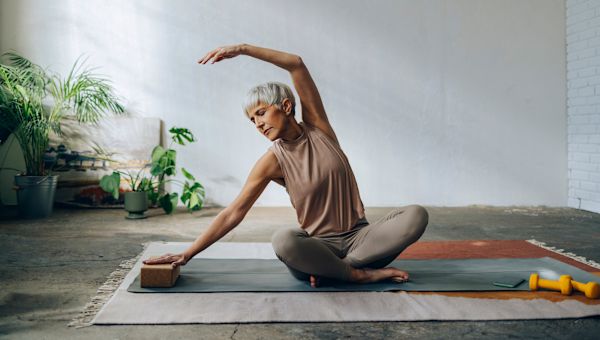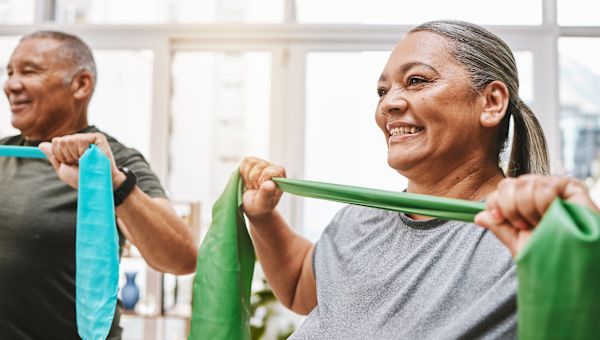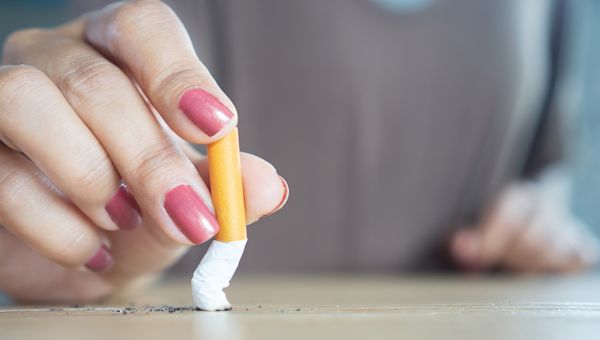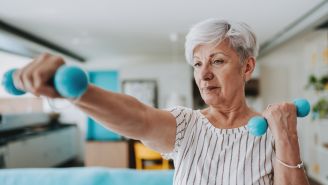10 ways to improve bone health
Follow these simple strategies to prevent or slow the bone loss that can lead to osteoporosis.
Updated on January 30, 2026

Most of us don't give much thought to our bones—until we break one. But according to the National Osteoporosis Foundation, half of all women over the age of 50 will break a bone, and the risk is even higher for people who are diagnosed with osteoporosis. A broken bone can be a serious health problem when you're older. That's why protecting your bones and keeping osteoporosis at bay is crucial.
Here are 10 ways to help keep your bones strong and healthy.

Get enough calcium
Dairy foods such as milk, yogurt, and cheese are among the best dietary sources of calcium. An 8-ounce glass of milk contains 314 milligrams (mg)—almost a third of what's recommended for women younger than 50, and a fourth of what women older than 50 need.
Your body can absorb only about 500 to 600 mg of calcium at a time, so try to get it from your food throughout the day. If you avoid dairy, consider calcium-fortified cereals, orange juice, soy milk, and breads. If you don't get enough calcium from food, talk to your healthcare provider (HCP) about supplements. Your HCP can help you decide how much calcium supplementation you need, and reduce your risk of potential side effects.

Load up on fruits and vegetables
A colorful diet rich in produce has been linked to better bone health, although experts aren't exactly sure why.
Fruits and veggies are rich in vitamin K, magnesium, and potassium—nutrients that play important roles in bone health. Simply eating a well-balanced diet is often enough to ensure you get these nutrients. The idea is to try to fill half your plate with fruits and veggies, a quarter of the plate with lean protein, and the other quarter with grains, preferably whole grains.

Make plums and berries a part of your diet
Many experts believe that osteoporosis is an inflammatory condition, which means foods that counteract inflammation may help reduce your risk for osteoporosis. Some research appears to confirm this notion.
Foods rich in antioxidants—such as berries and plums—can contribute to building bone and preventing bone loss. Even plums and berries that are dried may benefit bone health. A study at Florida State University found that postmenopausal women who ate 10 dried plums a day had higher bone density than those who consumed dried apples.

Find sources of vitamin D
Time in the sun helps your skin make vitamin D, a nutrient that is essential for the absorption of calcium and for good bone health. Unfortunately, most people don't get enough, often due to not spending time outdoors or living in areas of the world furthest from the equator.
It's important to balance the benefit of sunshine with the risk of skin cancer that comes from time spent in direct sunlight without sunscreen. Luckily, vitamin D can be found in many foods and supplements, and many experts recommend getting adequate vitamin D this way.
Adults under the age of 70 need 600 daily IUs (International Units) of vitamin D, while those over 70 require 800 IUs, according to the Institute of Medicine. You can get some from vitamin D-fortified milk, egg yolks, and fatty fish such as wild salmon, but the amount in food is limited. To find out if you're getting all the vitamin D you need, ask your HCP for a blood test.

Do bone-strengthening exercises
Your daily swim and bike ride may be good for your heart, lungs, and weight, but these exercises won't do much for your bones. It's important to do weight-bearing exercises—activities that involve making direct contact with the ground and that involve some, but not too much, strain on bones and joints.
Some options are those that involve running and jumping, such as racquet sports, jumping rope, and volleyball. Lower impact exercises, like walking and some yoga poses, can also boost bone health, while being gentler on joints. It's also important to include exercises that involve balance and core-strengthening to improve stability and coordination, which can help prevent falls and serious fractures.
Talk to your HCP about an exercise program that makes sense for you, given your age, fitness level, and health conditions.

Build muscle strength
A study at Mayo Clinic that looked at bone health in 272 women and 317 men ages 20 to 97 found that muscle mass is associated with bone strength at different locations of the body.
In women, muscle mass was strongly linked to bone strength at the hip, lumbar spine, and tibia bone in the shin, as well as the trabecular bone in the forearms.
To maintain muscle strength, try lifting weights or doing lunges and sit-to-stand exercises two to four times a week, says Nathan K. LeBrasseur, PhD, the lead author of the study and the director of the Robert and Arlene Kogod Center on Aging at Mayo Clinic. You can also work your muscles effectively by using resistance bands.

If you smoke, quit
Smoking cigarettes hurts nearly every organ in your body, so it's no surprise that it can impact your bone health, too.
In short, smoking speeds up the breakdown of your bone tissue, causing faster bone loss and weaker bones. Smokers who are assigned female at birth also tend to have lower levels of estrogen, the hormone that helps keep bones strong.

Know if your meds impact bone health
While medications may improve other health conditions, some drugs can weaken your bones and raise your risk for osteoporosis. Drugs that may cause bone loss include:
- Steroids, such as prednisone, which are used to treat asthma, lupus, and rheumatoid arthritis
- Selective serotonin reuptake inhibitors (SSRIs), which treat depression
- Proton pump inhibitors, prescribed to relieve heartburn and gastroesophageal reflux disease (GERD)
Ask your HCP if any of your medications can cause bone loss, and discuss taking the lowest dose possible for the shortest amount of time.

Consider an osteoporosis medication
There are drugs that can help maintain or improve your bone strength. Osteoporosis treatments do have side effects, ranging from uncomfortable (such as upset stomach) to serious (increased risk of stroke). Still, for people at risk of a hip or spine fracture or with other risk factors, the benefits may outweigh the drawbacks. Treatments commonly used include bisphosphonates, teriparatide, raloxifene, and hormone therapy. Ask your HCP if osteoporosis meds are right for you.

Mayo Clinic. Bone health: Tips to keep your bones healthy. December 3, 2022.
National Institute on Aging. Osteoporosis. Content reviewed: November 15, 2022.
Devine A, Criddle RA, Dick IM, Kerr DA, Prince RL. A longitudinal study of the effect of sodium and calcium intakes on regional bone density in postmenopausal women. Am J Clin Nutr. 1995;62(4):740-745.
More On


video

article


video


video


video
